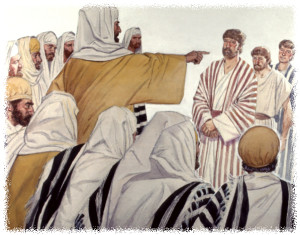 |
| Peter and John Before the Sanhedrin |
I consider it sufficient refutation of that view that it is the opposite of what Paul actually says, a twisting of the Scripture. However, I think it also gets the Arminian into serious trouble elsewhere.
In Acts, chapter 4, the Apostles Peter and John have been summoned before the Sanhedrin. Contrary, perhaps, to common sense, the Apostles tell these Jewish leaders (Acts 4:10-11), "Let it be known to all of you and to all the people of Israel that by the name of Jesus Christ of Nazareth, whom you crucified, whom God raised from the dead—by Him this man is standing before you well. This Jesus is the stone that was rejected by you, the builders, which has become the cornerstone." Afterward, the Apostles pray (Acts 4:27-28), "Truly in this city there were gathered together against Your holy servant Jesus, whom You anointed, both Herod and Pontius Pilate, along with the Gentiles and the peoples of Israel, to do whatever Your hand and Your plan had predestined to take place."
Now, the question raised by this passage is this: if predestination is simply God's declaration of what He has foreseen will happen, does the Arminian then suggest that the events described here happened by human will, were foreseen by God, and then predestined by Him? That makes complete nonsense out of the reactions of the Apostles! They express their security in the knowledge that the events, as frightening as they must have been, were in the predetermined will of God, so that there was no danger to them, outside the providence of God.
As a Calvinist, that is the security I derive from the doctrine of predestination for everything in my life. While I certainly have the same emotions as any other man, they are tempered by my foundational belief that everything, as scary as it may seem, is in the purposes of God, in which all things happen for my good (Romans 8:28). If there were events which are truly contingent on the will of men, that is, outside God's determining will, then would I be truly terrified.




No comments:
Post a Comment